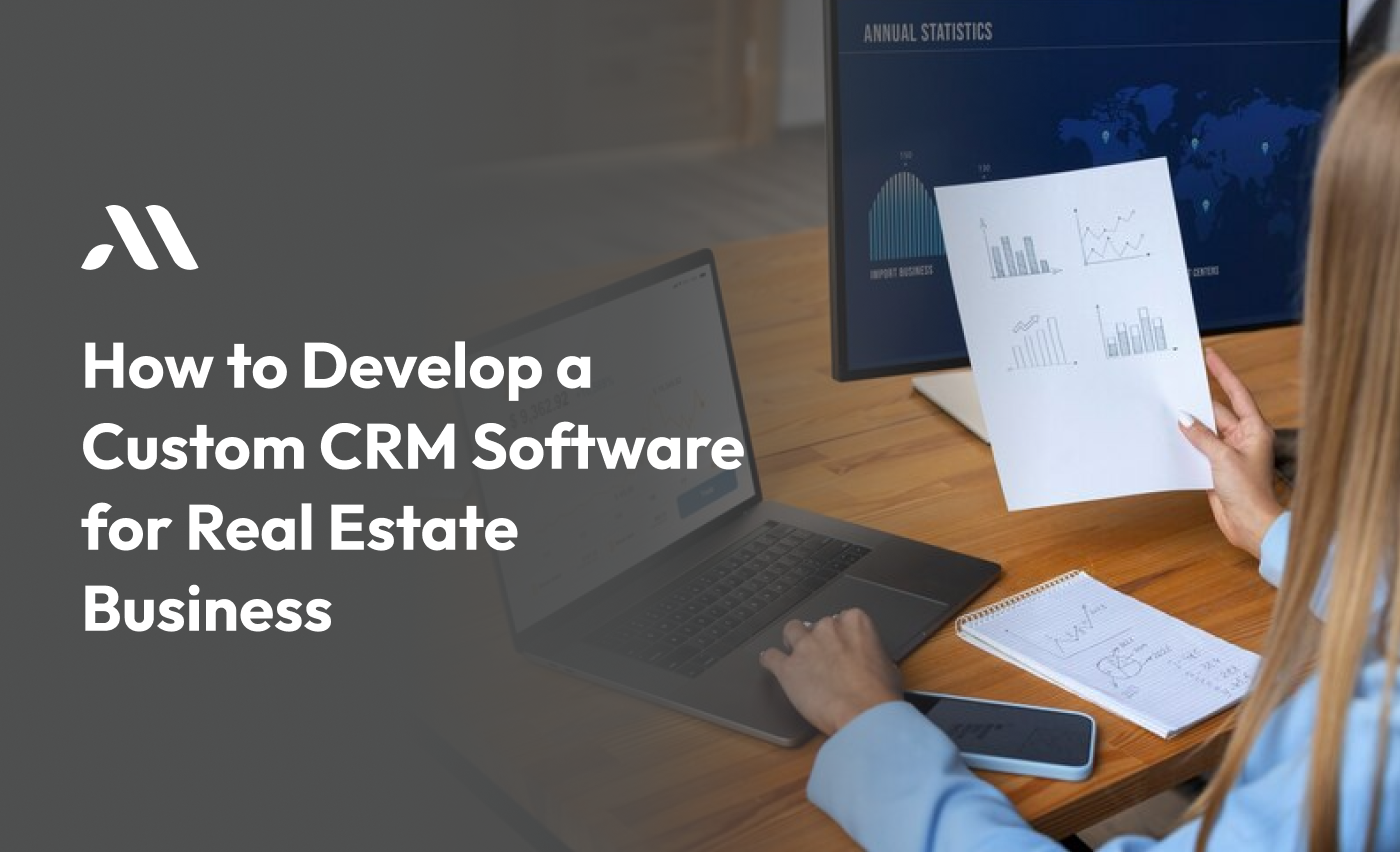Managing client relationships effectively is important for success in the real estate industry. This is where CRM (Customer Relationship Management) software comes in handy. Developing a custom CRM software customized specifically for your real estate business can help you simplify operations, manage leads, and ultimately grow your business. In this article, we’ll walk you through making CRM software that fits your needs perfectly.
1. Understanding the Need for Custom CRM Software
Before jumping into how to build a custom CRM, it's important to understand why you need it. Generic CRM software can not address the unique needs of a real estate business. With a custom CRM, you can:
- Manage Leads Efficiently: Track where each lead is in the sales process, from initial contact to closing a deal.
- Centralize Information: Store all client information, property details, and transaction history in one place.
- Automate Tasks: Save time by automating repetitive tasks like follow-up emails, appointment scheduling, and document management.
- Improve Customer Service: Provide better service by having all the information you need at your fingertips.
Remember: A well-designed custom CRM software can be a game-changer for your real estate business.
Also Read - Mobile App Development Costs for Real Estate
2. Key Features to Include in CRM for Real Estate
When planning how to make a CRM software for your real estate business, consider including the following features:
- Lead Management: Keep track of leads and their progress in the sales funnel.
- Contact Management: Store contact details, communication history, and preferences.
- Property Management: Manage property listings, including details like location, price, and status.
- Task Automation: Automate routine tasks such as follow-up emails and appointment reminders.
- Reporting and Analytics: Generate reports on sales performance, lead conversion rates, and more.
Tip: Customizing your CRM software with these features can significantly enhance your efficiency and productivity.
3. Steps to Develop a Custom CRM Software
Now that you know the importance of CRM for real estate and the key features to include, let’s discuss how to build a custom CRM.
Step 1: Identify Your Business Needs
Start by identifying the specific needs of your real estate business. Do you need better lead tracking? Improved communication tools? More detailed property management? Understanding your needs will help you decide on the important features of your custom CRM software.
Step 2: Choose a CRM Development Company
Once you’ve identified your needs, the next step is to choose a CRM Development Company. Look for a company with experience in developing CRM software for real estate businesses. Check their Portfolio and ask for client testimonials to ensure they have the expertise required.
Note: Choosing the right CRM development company is important for the success of your custom CRM software.
Step 3: Design the CRM Software
Work closely with the development team to design the CRM software. Make sure the user interface is intuitive and easy to navigate. The design should reflect your business processes and make it easy for your team to use the software.
Step 4: Develop and Test the Software
After the design phase, the development team will start building the software. Regularly check in with them to ensure everything is on track. Once the software is developed, it’s important to thoroughly test it to identify and fix any bugs or issues.
"Testing is not an option; it’s a necessity. It ensures that your CRM software works smoothly and efficiently."
Step 5: Implement the CRM Software
Once the software has been tested and is ready to go, it’s time to implement it in your business. Provide training to your team to ensure they understand how to use the new system effectively. Gradually transition from your old system to the new CRM software to avoid any disruptions in your business operations.
4. Benefits of Custom CRM Software
Developing a custom CRM software for your real estate business offers numerous benefits:
- Customized to Your Needs: Unlike generic CRM software, custom CRM software is designed specifically for your business, ensuring it meets all your needs.
- Scalability: Custom CRM software can grow with your business. You can add new features as your business expands.
- Competitive Advantage: Having a CRM system that’s customized to your business gives you a competitive edge over others who are using generic software.
- Improved Client Relationships: With better lead and contact management, you can build stronger relationships with your clients, leading to higher customer satisfaction and loyalty.
Remember: A custom CRM software is an investment in the future of your real estate business.
5. Cost of Developing a Custom CRM Software
The cost of developing a custom CRM software can vary depending on several factors, including:
- Features and Functionality: The more features you want, the higher the cost.
- Complexity: The complexity of the software, including integrations with other systems, can impact the cost.
- Development Time: The longer it takes to develop the software, the more it will cost.
On average, developing a custom CRM software for real estate can cost anywhere from $30,000 to $150,000, depending on your requirements. However, the benefits of having a CRM tailored to your business can far outweigh the initial investment.
Tip: When budgeting for your CRM software, consider not only the development cost but also ongoing maintenance and support.
Also Read - How to Develop SaaS Solution for Real Estate
6. Future Trends in CRM Software for Real Estate
As technology continues to evolve, so too does CRM software. Here are some trends to watch out for:
- Artificial Intelligence (AI): AI-powered CRM systems can automate even more tasks, such as lead scoring and predictive analytics.
- Mobile CRM: With more people working remotely, having a CRM that’s accessible on mobile devices is becoming increasingly important.
- Integration with Other Tools: CRM software is increasingly being integrated with other tools like email marketing platforms, social media, and property management systems.
Note: Staying up-to-date with these trends can help you keep your CRM software relevant and effective.
Conclusion
Developing a custom CRM software for your real estate business is a smart investment that can lead to improved efficiency, better client relationships, and increased profits. By understanding your needs, choosing the right CRM development company, and focusing on key features, you can create a CRM system that perfectly fits your business.
Ready to take your real estate business to the next level? MicraSol can help you build a custom CRM software that’s perfect for your needs. Streamline your processes, manage leads better, and boost your success. Contact us today to get started with a solution customized just for you!
Whether you’re a small real estate agency or a large firm, having custom CRM software can set you apart from the competition and help you achieve long-term success.
"Investing in custom CRM software is investing in the future of your real estate business."
FAQS
What is CRM software, and why do I need it for my real estate business?
CRM (Customer Relationship Management) software helps you manage relationships with your clients by organizing contact information, tracking leads, and automating tasks. For a real estate business, it’s especially useful because it can help you keep track of properties, manage communications, and improve customer service.
What’s the difference between generic CRM software and custom CRM software?
Generic CRM software is designed for all kinds of businesses, so it might not have the specific features you need for real estate. Custom CRM software is built just for your business, so it includes all the tools and features that fit your exact needs.
How do I start developing custom CRM software for my real estate business?
Start by figuring out what you need the CRM to do for your business. Do you need better lead tracking? Easier property management? Once you know what you need, find a CRM development company that can build the software for you. Work with them to design, develop, and test the CRM before launching it in your business.
How much does it cost to develop custom CRM software for real estate?
The cost can vary based on the features you want and the complexity of the software. Typically, it can cost anywhere from $30,000 to $150,000. It’s important to think of it as an investment that can help your business grow in the long run.
What features should I include in my custom CRM software?
Some key features to consider include lead management, contact management, property management, task automation, and reporting tools. These features help you stay organized and efficient, making it easier to manage your real estate business.








